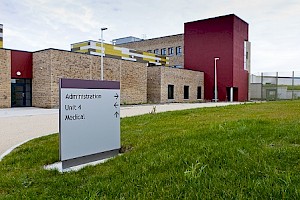Youth Justice
Ireland has a long history of poor responses to offending behaviour by children. A core strand to IPRT's work since its establishment in 1994 has been the promotion of a more effective youth justice system, with emphasis on non-custodial alternatives, diversion, early intervention and prevention strategies and programmes. Central to our work was ending the practice of detaining children in adult prisons, which was in breach of international human rights standards and a serious stain on Ireland's human rights record.
International human rights standards, and in particular the provisions of the UN Convention on the Rights of the Child, are clear that custody for children should only be used as a last resort and for the minimum required period of time. All efforts should be made to apply alternatives to detention to ensure that such a measure is only used in exceptional circumstances.
In Ireland, the Children Act 2001 recognizes the principle of detention as a last resort. The Act prohibits the imprisonment of children and the Criminal Justice Act 2006 makes provision for all children less than 18 years of age to be detained in Children Detention Schools. The detention school model is focused on a model of care, education, health and programmes that address offending, with improved outcomes for the young people, their communities and all of society. The Irish Youth Justice Service is responsible for the Children Detention Schools, within the Department of Children and Youth Affairs.
Following years of sustained advocacy by IPRT, along with many national and international bodies, in 2012 the detention of boys aged under 17 at St Patrick's Institution ended. In March 2017, a Ministerial Order ended the sentencing of children aged under 18 to adult prison in Ireland, and in April 2017, St. Patrick’s Institution was finally closed. Since September 2017 boys aged under 18 are no longer detained in the adult prison system.
IPRT continues to work towards progressive change in youth justice policies and practice, as well as engaging with wider policy and practice issues relating to youth justice, such as the provision of alternatives to detention, diversion and early intervention programmes.

UK: “Young Lives Behind Bars: The health and human rights of children and young people detained in the criminal justice system”, British Medical Association
31st October 2014
A report by the British Medical Association, on the medical service provision for young offenders in both custodial and communal settings in England and Wales.
2013 Report on the Garda Diversion Programme
22nd March 2014
The Department of Justice and Equality has published the 'Annual Report of the Committee Appointed to Monitor the Effectiveness of the Diversion Programme 2013’.
Ombudsman for Children's Office publish report on Children in Care
4th March 2014
A report by the Ombudsman for Children's Office provides an overview and analysis of the repetitive issues and their root causes regarding the provision of services for children in care.
IYJS: 'Tackling Youth Crime' Youth Justice Action Plan 2014-2018 published
3rd February 2014
The Irish Youth Justice Service has published its action plan 'Tackling Youth Crime – Youth Justice Action Plan, 2014-2018' as a successor to its 2008 'National Youth Justice Strategy'
Irish Times: 'Young offenders have the same remission rights as adults'
20th January 2014
A 17 year-old applicant, held at the children's detention school in Oberstown, has successfully challenged the constitutionality of the state's failure to provide him the same level of remission as afforded to adult offenders and juveniles held at St. Patrick's institution.
Report on effectiveness of Garda Youth Diversion Programme 2012
30th December 2013
The Department of Justice and Equality has published the 'Report of the Committee to monitor the effectiveness of the Garda Diversion Programme 2012'. The report records a drop in the number of children coming to the attention of the Gardaí for a sixth year in a row
UK: 'Same Old…' failures in mental health provision for young offenders
11th December 2013
UK youth organisations, The Transition to Adulthood Alliance (T2A) and Young Minds, have issued a new report on the lack of provision of mental health services to young people at risk of or engaging in offending behaviour.
Fourth Inspection Report of the Children Detention School on Oberstown Campus
30th November 2013
Inspectors found the management and staff team on Oberstown Campus provided a good overall standard of care including education and healthcare. However, concerns were voiced over how offending behaviour was addressed and the use of protection rooms in Trinity House School, particularly their suitability for containing children.
Probation Service: 'Drug and Alcohol misuse among young offenders on probation supervision in Ireland'
25th October 2013
The Probation Service has launched a new research report; “Drug and Alcohol Misuse among Young Offenders on Probation Supervision in Ireland”. This report presents the findings from a national survey undertaken by the Probation Service on young offenders.
Construction at Oberstown a ‘momentous’ step towards ending imprisonment of children in Ireland
14th October 2013
MEDIA ADVISORY: The Irish Penal Reform Trust (IPRT) has hailed as ‘momentous’ the announcement today by Minister for Children, Frances Fitzgerald TD, that the construction of new national children detention facilities at Oberstown, Lusk, Co. Dublin has begun.




